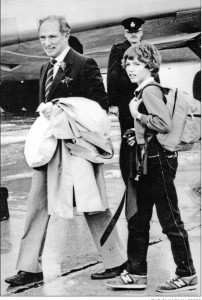
In today’s Globe & Mail, Lysianne Gagnon takes aim at Justin Trudeau:
Is Justin Trudeau really the Liberals’ best option?
If the Toronto Liberal intelligentsia believe that Justin Trudeau, being a Trudeau and a Quebecker, can revive their party’s fortunes in Quebec, they are mightily wrong. (One might also wonder if anybody can save the Liberal Party of Canada now that the NDP occupies the centre-left, but this is another question.)
Justin’s surname is as much a liability in French-speaking Quebec as it is in Alberta. Personally, I find this hostility regrettable and irrational to boot, but the reality is that more than anybody else, Trudeau Senior remains the nemesis not only of the sovereigntists but of all of Quebec’s “soft” nationalists.
Any mention of the former prime minister provokes even more anger and resentment in Quebec than in Alberta, where people still fume over the infamous national energy program, which was seen as a violation of the province’s right to control its natural resources.
On behalf of the Toronto Liberal intelligentsia, allow me to offer a brief rebuttal.
I don’t doubt that many Quebecers spit whenever they hear the Trudeau name, but despite what the Quebec chattering classes have been saying for decades, there is no evidence whatsoever to suggest this feeling is widespread.
Take this Angus Reid poll from last summer asking Canadians who they’d pick as the best Prime Minister from the past 40 years. Topping the list in Quebec, with 26% of the vote, was none other than Pierre Trudeau. That’s double the percentage ranking Trudeau the worst Prime Minister, and it’s double the vote share the Liberals received in Quebec last election.
Supporting Justin Trudeau’s pre-natal Liberal leadership bid because of his last name and lingering feelings for his father would be a mistake. Opposing it for that same reason would be downright folly.
7 responses to “The Name Game”
Even Albertans are divided on Prime Minister Trudeau.
Albertans are definitely more negative than positive but, once again, the number ranking PET the best PM is higher than the Liberal vote share in the province.
The Cons and their supporters are very afraid of JT leading the Libs.
Why do Gagnon and the G&M think that they are speaking for Quebec when nobody, including Gagnon and Hebert, two supposed “experts” on Quebec, failed miserably to predict the massive swing to the NDP in the last election?
The PQ won the 1976 election, but that did not stop Trudeau from taking 74 out of 75 seats in the 1980 election and 68.2% of the vote. The notion that there ever was a large body of “soft nationalists” and hard core federalists in Quebec is mistaken. The voting population is not that sophisticated. The conclusion that should be drawn is that as your average voter knows very little about policy, Quebecers had no problem voting for pro sovereignty party at a provincial level and staunchly pro federalist party at the Federal level. It all came down to who they trusted and Quebecers had always believed that, love him or hate him, Trudeau and the Liberal party would always fight to create a place for the French language and culture inside Canada. With the signing of the Kitchen Accord, Trudeau and greater extent his party lost that trust and with that the Liberal party lost their strangle hold on Quebec forever. Just as the PQ were starting to cast doubt on the trustworthiness of the Liberal party with absurdly named “night of the long knives” narrative, the Liberals nominated an Anglophone to lead the party and the Conservatives a Francophone.
All that being said, it should come as no surprise that many Quebecer still have a soft spot for Trudeau and myth that surrounds him. The masses in Quebec have not moved on from Trudeau’s brand of federalism for the simply reason that they never had a firm grasp of it nor its alternative.
Comparing Quebec and Alberta doesn’t make sense if you are talking about somebody’s political viability. I have no doubt that Trudeau is reviled by separatists in Quebec, and that even soft nationalists may be iffy on him.
However, there’s a solid bloc of hardline federalist voters in the province, for whom Trudeau is well-liked. If the Liberals could galvanize that group behind them, they’d fare quite well (obviously there are a lot of other challenges to doing that, but the Trudeau name would not be a hindrance in that regard). I suspect part of the problem is that when our anointed columnists from Quebec talk about la belle province, they don’t think about Anglophones or Allophones.
Running Trudeau was definitely not electoral suicide in Papineau. In 2004 (with a strong candidate, Pettigrew) the Liberals won 41.1% of the vote in Papineau, while winning 34% of the vote in the province. Under Trudeau that vote has basically held. Trudeau won 38.4% of the vote there in 2011, even as Liberal in Quebec fell to 14.2%. So the riding has gone from being 7.1% better than the provincial average to 24.2% better.
Perhaps a better part of that article worth quoting would be where Gagnon points out that – apart from his famous name – Justin Trudeau has little to his CV other than being a former high-school teacher. There’s no indications of the intellect of his father let alone any depth at all – and he’d be up against experienced rivals in the CPC and NDP, both of which have far healthier organizations than a creaking Liberal Party.
…the Liberals nominated an Anglophone to lead the party and the Conservatives a Francophone.
Mulroney is a Francophone?
ok that was a brain fart. Irish eyes are not smiling.